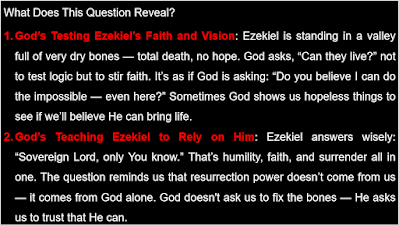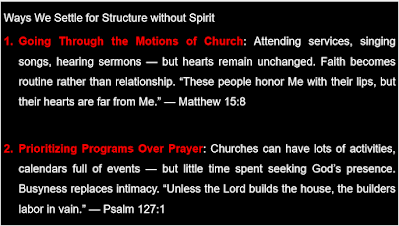The Whole Story
Ezekiel 37 is a powerful and symbolic vision
that communicates God’s ability to bring life and hope to His people, even in
the most hopeless and desolate situations. This chapter, often referred to as
the vision of the Valley of Dry Bones, offers a profound message of
restoration, revival, and the sovereignty of God over life and death. It
reveals God’s promise to restore Israel, both spiritually and physically, as a
testimony of His power to resurrect what is dead and to bring new life where
all seems lost.
The vision begins with Ezekiel being led by
God’s Spirit to a valley filled with dry bones, a scene that symbolizes the
spiritual death and desolation of the people of Israel. God asks Ezekiel, “Son
of man, can these bones live?” to which Ezekiel replies, “Sovereign Lord, you
alone know” (v.3). This question underscores the hopelessness of the situation,
yet Ezekiel’s answer reflects his trust in God’s power, even when the
circumstances seem beyond repair. God instructs Ezekiel to prophesy over the
bones, commanding them to hear the word of the Lord (v.4). As he does, the
bones begin to come together, sinews and flesh form on them, and they are
covered with skin, yet they remain lifeless (v.8).
God then tells Ezekiel to prophesy to the
breath (or spirit) to enter the bodies, and as he does, the breath enters them,
bringing them to life (v.9). This dramatic transformation symbolizes God’s
power to bring spiritual renewal and restoration to His people, infusing them
with His Spirit. The army of revived people represents Israel’s restoration
from exile, a symbol of how God will bring His people back to their land and
revive their spiritual condition.
The second part of the chapter offers an
explanation of the vision. God declares that just as He will bring Israel’s dry
bones back to life, He will also reunite the divided northern and southern
kingdoms and restore them as one people under His rule (v.22-24). He promises
to place His Spirit within them, enabling them to live according to His laws
and to enjoy His peace and presence forever. God’s covenant with His people
will be renewed, and they will know that He is the Lord (v.26-28).
Ezekiel 37 is a powerful declaration of God’s
ability to revive, restore, and renew. It shows that no matter how far gone a
situation may seem — whether it be a nation in exile or an individual in
spiritual dryness — God can breathe life into it. This vision points to the
ultimate hope of resurrection and renewal, fulfilled in Jesus Christ, who
brings eternal life to those who are spiritually dead. It reminds us that God's
power to restore is boundless, and His promises are sure. The promise of
Ezekiel 37 finds ultimate fulfillment and power in Jesus the one who gives dry
bones and dead souls, life again. Jesus is here, even in Ezekiel 37.
Ezekiel 37: 1-14
The Valley of Dry Bones
37 The hand of the Lord was upon me, and he
brought me out in the Spirit of the Lord and set me down in the middle of the
valley; it was full of bones. 2 And he led me around among them, and behold,
there were very many on the surface of the valley, and behold, they were very
dry. 3 And he said to me, “Son of man, can these bones live?” And I answered,
“O Lord God, you know.” 4 Then he said to me, “Prophesy over these bones, and
say to them, O dry bones, hear the word of the Lord. 5 Thus says the Lord God to
these bones: Behold, I will cause breath to enter you, and you shall live. 6
And I will lay sinews upon you, and will cause flesh to come upon you, and
cover you with skin, and put breath in you, and you shall live, and you shall
know that I am the Lord.” 7 So I prophesied as I was commanded. And as I
prophesied, there was a sound, and behold, a rattling, and the bones came
together, bone to its bone. 8 And I looked, and behold, there were sinews on
them, and flesh had come upon them, and skin had covered them. But there was no
breath in them. 9 Then he said to me, “Prophesy to the breath; prophesy, son of
man, and say to the breath, Thus says the Lord God: Come from the four winds, O
breath, and breathe on these slain, that they may live.” 10 So I prophesied as
he commanded me, and the breath came into them, and they lived and stood on
their feet, an exceedingly great army. 11 Then he said to me, “Son of man,
these bones are the whole house of Israel. Behold, they say, ‘Our bones are
dried up, and our hope is lost; we are indeed cut off.’ 12 Therefore prophesy,
and say to them, Thus says the Lord God: Behold, I will open your graves and
raise you from your graves, O my people. And I will bring you into the land of
Israel. 13 And you shall know that I am the Lord, when I open your graves, and
raise you from your graves, O my people. 14 And I will put my Spirit within
you, and you shall live, and I will place you in your own land. Then you shall
know that I am the Lord; I have spoken, and I will do it, declares the Lord.”
The
Holy Bible, English Standard Version. ESV® Text Edition: 2016. Copyright © 2001
by Crossway Bibles, a publishing ministry of Good News Publishers. Ezekiel
31:1-14
Discussion Questions
- What does God’s question in verse 3 — “Can these bones live?” — reveal about how He wants Ezekiel (and us) to respond to hopeless situations?
- Why does God tell Ezekiel to prophesy over dry bones instead of fixing the situation Himself? What does this say about the power of God’s Word spoken through His people?
- What’s the significance of the two-stage revival in verses 7–8 (structure without breath, then breath)? Can you think of examples where there is spiritual form without spiritual life? Is it possible to look spiritually alive but lack the Spirit’s power? How do we avoid this?
- What does it mean to be filled with the breath of God? How does this part of the vision connect to personal and corporate revival? What does it look like in your life to daily depend on the Spirit rather than your own strength?
- How does God’s promise in verse 14 give you confidence for your future — even in seasons that feel like exile or death? Where in your life do you need to cling to this promise today?
Closing Thoughts:
Ezekiel 37 reminds us that
no situation is too dead, too far gone, or too broken for God to redeem. The
same Spirit who brought life to dry bones is still at work today, breathing
life into weary hearts, broken relationships, stagnant faith, and lifeless
churches. But revival doesn’t begin with hype — it begins with hearing God’s
Word and being filled with His Spirit. Just as the bones came together and
stood up only after Ezekiel obeyed and prophesied, so God invites us to trust
His voice and walk in obedience, even when the valley feels hopeless. The
question is not whether God can bring life, but whether we are willing to
believe Him and respond. Where in your life are you longing for God to breathe
new life today?
END
Teacher's Notes:
Ezekiel 37: 1-14
The Valley of Dry Bones
37 The hand of the Lord was upon me, and he
brought me out in the Spirit of the Lord and set me down in the middle of the
valley; it was full of bones. 2 And he led me around among them, and behold,
there were very many on the surface of the valley, and behold, they were very
dry. 3 And he said to me, “Son of man, can these bones live?” And I answered,
“O Lord God, you know.” 4 Then he said to me, “Prophesy over these bones, and
say to them, O dry bones, hear the word of the Lord. 5 Thus says the Lord God to
these bones: Behold, I will cause breath to enter you, and you shall live. 6
And I will lay sinews upon you, and will cause flesh to come upon you, and
cover you with skin, and put breath in you, and you shall live, and you shall
know that I am the Lord.” 7 So I prophesied as I was commanded. And as I
prophesied, there was a sound, and behold, a rattling, and the bones came
together, bone to its bone. 8 And I looked, and behold, there were sinews on
them, and flesh had come upon them, and skin had covered them. But there was no
breath in them. 9 Then he said to me, “Prophesy to the breath; prophesy, son of
man, and say to the breath, Thus says the Lord God: Come from the four winds, O
breath, and breathe on these slain, that they may live.” 10 So I prophesied as
he commanded me, and the breath came into them, and they lived and stood on
their feet, an exceedingly great army. 11 Then he said to me, “Son of man,
these bones are the whole house of Israel. Behold, they say, ‘Our bones are
dried up, and our hope is lost; we are indeed cut off.’ 12 Therefore prophesy,
and say to them, Thus says the Lord God: Behold, I will open your graves and
raise you from your graves, O my people. And I will bring you into the land of
Israel. 13 And you shall know that I am the Lord, when I open your graves, and
raise you from your graves, O my people. 14 And I will put my Spirit within
you, and you shall live, and I will place you in your own land. Then you shall
know that I am the Lord; I have spoken, and I will do it, declares the Lord.”
Click Play to Watch
























No comments:
Post a Comment